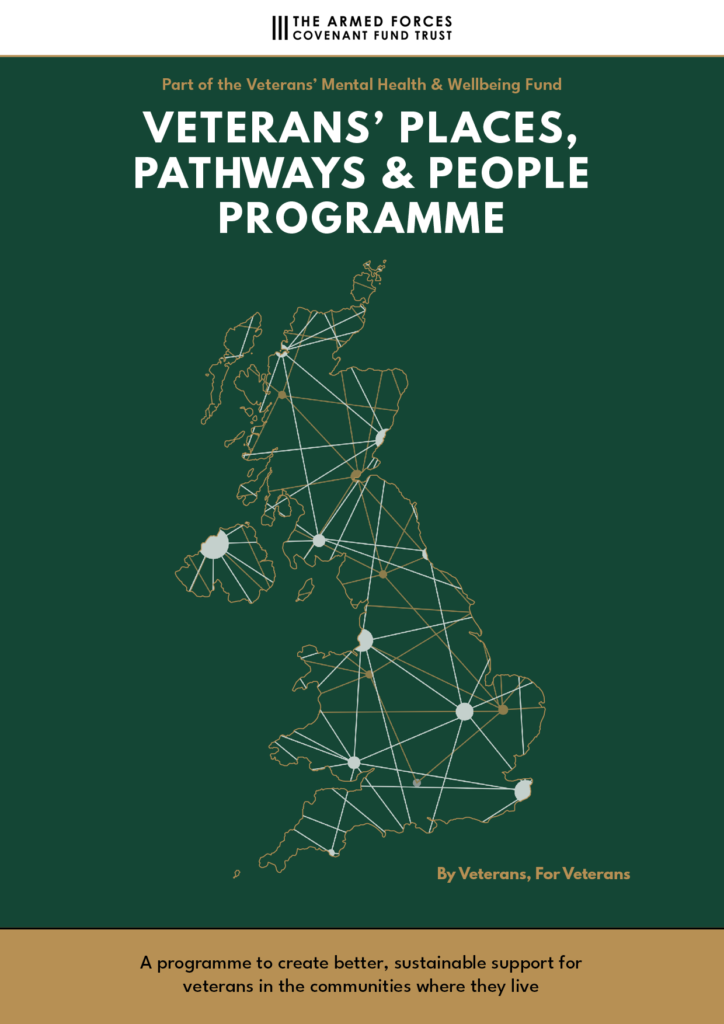VPPP projects making a positive impact on veterans’ lives
As most Veterans’ Places, Pathways and People (VPPP) portfolio projects complete their first six months of delivery, let’s take a look at some of their activities and achievements so far…
What is the VPPP programme?
The VPPP programme aims to give veterans safe places in their local area where they can access help and treatment that supports their mental health needs.
It also aims to ensure that the people supporting veterans through these projects, both paid staff and volunteers, can access good quality training and are equipped to better connect veterans into appropriate pathways and wider support networks.
Ten portfolio projects throughout the UK received a share of almost £8 million, with around 170 organisations and projects delivering work within those portfolios to achieve the programme aims.
Grants totalling £1 million were also awarded to four Strategic Lead organisations, which work with a cross-sector oversight group.
Each member organisation within the portfolios brings their own expertise and specialisms, with some organisations being involved in several portfolios. This further enhances the joined-up approach that is at the heart of the programme and what it seeks to achieve.
What are portfolios doing?
Following the initial project set-up, including launch events to introduce the projects and promote their work and services to the Armed Forces community, and communities at large; the projects are now beginning to develop training programmes to share knowledge in key areas.
In Wales, a series of veterans’ roadshows are planned to enable V4P portfolio members and other organisations supporting the Armed Forces community to promote their services.
A Social Prescribing working group has been established in the North West, which includes mapping existing provision in the region, and the outputs from this are being shared to create a better understanding of how to raise awareness of existing and emerging services. Broughton House, the North West portfolio lead, has also convened two sub-groups, focusing on Mental Health and Wellbeing, and Lived Experience, which have explored a range of topics and are taking forward a number of key ideas and insights for further development.
Veterans in a wide range of circumstances are being supported directly by portfolio projects across the UK. The Brighter Futures for Veterans project in the South West, led by the Invictus Games Foundation, reports that the South West Integrated Personalised Care Team has supported 182 veterans since the project received the VPPP grant, and the team is now working to widen the portfolio’s network.
VPPP projects are saving lives
One portfolio lead recently supported a young veteran following a desperate call from his mum – she was concerned he might try to harm himself, and soon after her fears were realised when he tried to take his own life. A VPPP-supported project intervened and is now offering him practical and emotional support, and he regularly attends a support group, which helps him deal with the issues he is facing.
During the promotion of the VPPP portfolio projects to stakeholders in the North West, a currently serving officer who was present came forward to request support for their spouse, who had recently been medically discharged from the Army due to mental health issues. He had felt let down by the system and eventually tried to take his own life. Within 48 hours of the request for help, the veteran had been triaged by Armed Forces Community HQ and offered person-centred counselling and is currently engaging with support. He has been referred directly to support services with the NHS and has engaged with a local peer drop-in service provided with the help of VPPP funding. He now wishes to volunteer to provide a sense of fulfilment and purpose “and a future” once his treatment is complete.
Projects supported by the VPPP programme are supporting veterans every day in practical and tangible ways, but portfolio leads have also identified a range of outcomes and impacts they anticipate throughout the life of the programme and beyond.
What impact do they expect to achieve?
Already, portfolio members are reporting improvement of existing services and promoting those services to a wider audience. Having a collaborative approach with several new partners is seen as an important development in enhancing existing provision by being able to draw on a larger pool of expertise. These broader networks also amplify awareness among the Armed Forces community to reach veterans that may not have accessed the support they need in the past.
Looking ahead, we expect to see greater collaboration between sectors and between regions, an increase in the services available to veterans and significant improvements in the experiences of those veterans.
Portfolio leads highlight key areas where they expect veterans to see tangible improvements, such as:
- better, more inclusive services
- a reduction in the number of times they need to retell their story, because of better coordination
- an increase in referrals from GPs to mental health services
- a measurable decrease in the number of veterans’ suicides or incidences of self-harm
- an overall improvement in confidence and ability to seek help.
In the long term it is hoped these positive outcomes and impacts will become embedded in how services are delivered and the experiences of veterans seeking help.
Key themes for the overall impact and legacy of the programme fall into a few main areas.
- Improving services and delivery.
- Improving health and wellbeing.
- Reaching more veterans in need.
Developing resilience in organisations and people is noted, which is perhaps a natural consequence should the other positive impacts be realised.
Learning and insights will be ongoing and part of the legacy of the programme, and we will continue to share them.
Find out more
You can find out more about the Veterans’ Places, Pathways and People programme here.
